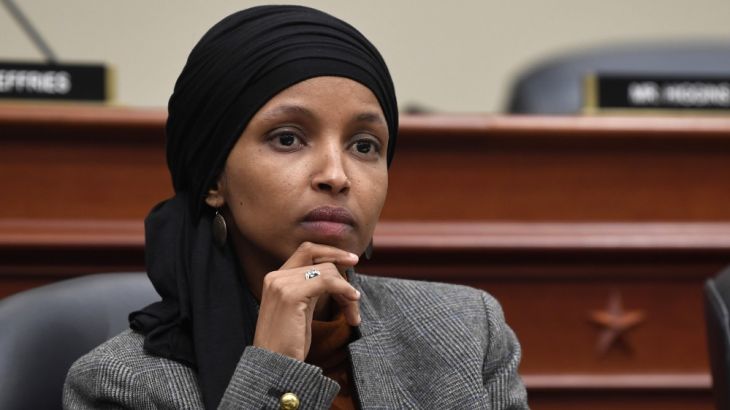
Ilhan Omar on her 9/11 comments, Trump, and US-Saudi relations
The US politician discusses Donald Trump’s defamatory statements against her, and his links to ‘hostile’ foreign states.
Since President Donald Trump came to power in the United States, he has made global headlines for his often audacious comments on women’s rights, foreign political interference, Muslims, and immigrants.
#TrumpisRacist and #RacistinChief are some of the hashtags trending on social media platforms after Trump told four women of colour in Congress (three of whom were born in the US) to go back to the “totally broken and crime-infested places from which they came”.
Keep reading
list of 4 itemsThe Take: Trump v United States
Witness testimony continues in Trump’s New York hush money trial
Six takeaways from Trump immunity hearing and New York hush money trial
Ilhan Omar, House of Representatives member for Minnesota, was among those targeted.
Born in Somalia, she escaped the civil war to spend much of her childhood in a refugee camp in Kenya, before her family emigrated to the US – where she is a citizen. In 2016, she became the first elected Somali-American Muslim legislator in the US.
This was not the only time she has faced the president’s ire.
Trump has made defamatory comments accusing her of praising al-Qaeda, and saying that she downplayed the 9/11 terror attacks.
Our alliedship with Saudi Arabia and the Emirates is immoral. I believe that it is one of the most absurd alliedships; it doesn't fit with any of our values. When we think about what is in the interest of our national security, entrusting them to help us with that is like trusting a thief to watch over your shop.
Responding to Trump’s accusations, Omar tells Al Jazeera: “Those [9/11] are horrific attacks. There’s no question about it, that’s not a debatable thing. Innocent Americans lost their lives that day, we all mourn their deaths … And I think it’s quite disgusting that people even question that and want to debate that.”
Trump made the comments after Omar said Muslims in America have lost access to their civil liberties because they are collectively seen to be responsible for the attacks claimed by al-Qaeda.
“What is important is the larger point that I was speaking to,” Omar clarifies, “which is about making sure that blame isn’t placed on a whole faith, that we as Muslims are not collectively blamed for the actions of terrorists.”
“I do not blame every single white person when we have a white man who massacres children at a school, or moviegoers in a movie theatre. And I think this really horrendous narrative that says, as a Muslim, I’m supposed to explain, apologise, for the actions of someone who’s also terrorising me, is absurd.”
Omar is critical of Trump’s leadership and has supported calls for him to be impeached.
“I always said it wasn’t the question of whether he should be impeached, but when. And we are seeing now so many people are coming to that conclusion,” she says. “This president said he didn’t see any problem in having a foreign, hostile government [Russia] intervene in our elections. He didn’t understand how that could be a problem … We do not accept information that is going to change the trajectory of our elections, from hostile governments.”
Omar is vocal in her opposition to other US-foreign allegiances, including the relationship with Saudi Arabia and the United Arab Emirates (UAE).
“How can we make a decision to sell weapons to Saudi Arabia, knowing that they have been part of causing one of the most atrocious humanitarian crises in Yemen, when we know that they have a hand in what’s happening right now in Sudan, what’s happening in Libya, and the list can go on and on and on,” she says.
“Our alliedship with Saudi Arabia and the Emirates is immoral. I believe that it is one of the most absurd alliedships; it doesn’t fit with any of our values. When we think about what is in the interest of our national security, entrusting them to help us with that is like trusting a thief to watch over your shop. We know that they can’t be trusted in that process.”
Omar acknowledges the challenges posed by the current US administration, but believes the polarisation it creates has resulted in some positive side effects, including mass mobilisation of voters and the election of the most diverse Congress in US history.
“The positive thing is that every time there is a challenge, there is an opportunity. Because we have the most divisive president [and] we’re living in historically traumatising times … so many people are rising up, to not only resist the detrimental policies that are coming from this administration, but to also insist on having the America we all know we deserve,” she says.
“So that’s why you’re seeing the rise of so many people who have always sat on the margins of society, saying ‘this is our time to seek our seat at the table, we have to make sure that we’re representing all of our voices’.”
Editor’s note: This interview was recorded on June 13, 2019.